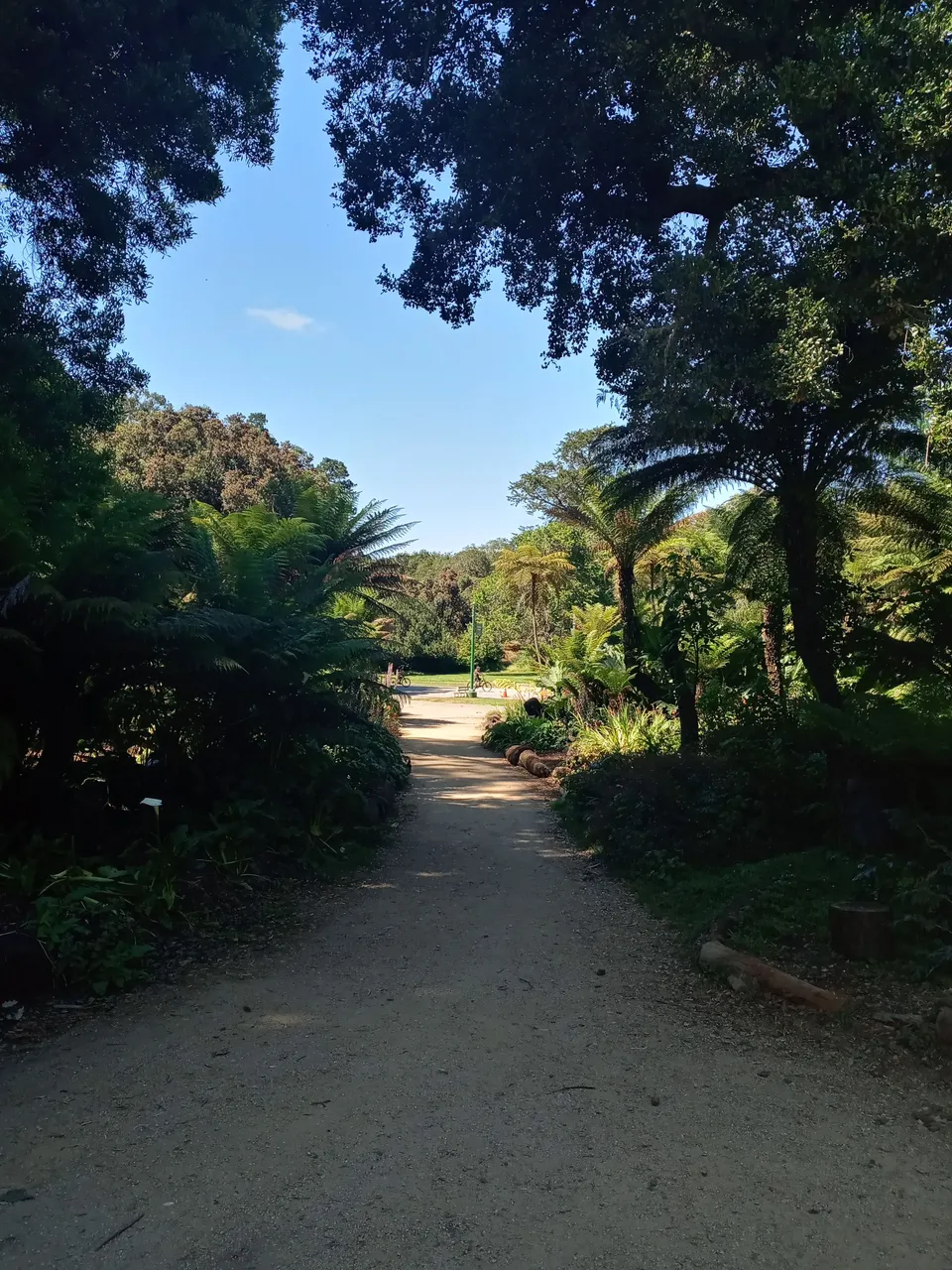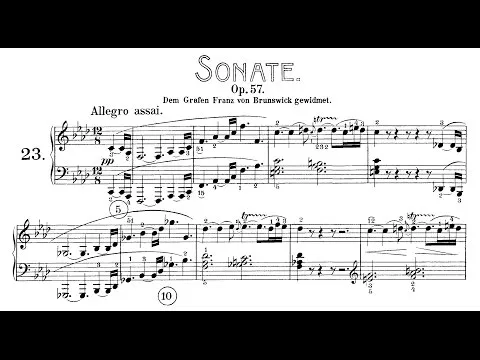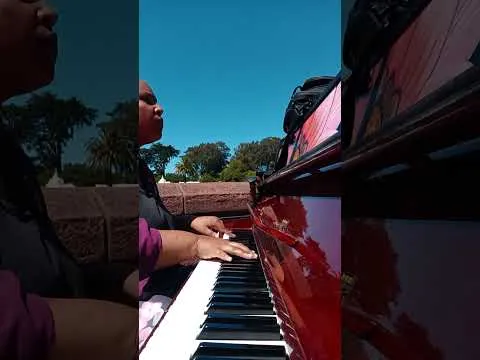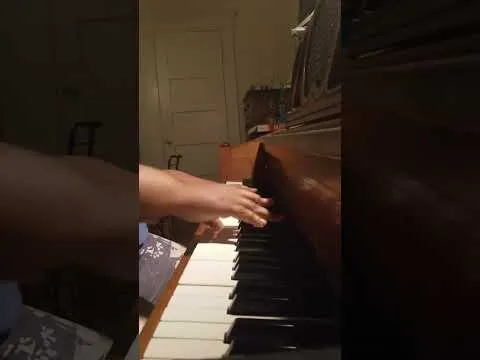All photos by the author, Deeann D. Mathews, July 16, 2024

There are moments when you consider revisiting a place or a friendship, but with perspective, you realize: as good as it was, there is no going back. Golden Gate Park's Lily Pond will be rescued at some point from its summer algae bloom, terrible shock as that was to me in an otherwise beautiful walk. Some human relationships: not so much.
There is this one place in Beethoven's Opus 57 piano sonata -- in the coda of the first movement -- where it still hits me as it did the first time I heard Artur Rubinstein play it: this is the moment where you can know, just before that beautiful hymn-like second movement that will be denied a commensurately heavenly ending, and long before you realize there are no major-key themes in the third movement, but all are unrelenting in minor -- this is the melodic moment that you can know that whatever tragedy had driven Beethoven into this F minor mood for his 23rd piano sonata was not going to be OK, ever. The timestamp is 8:55 (and there are THREE ENTIRE RECORDINGS here for you to enjoy at your leisure ... different interpretations are AMAZING).
I finally went and sat down at the piano and worked it out ...
The reason this is so devastating is that the main theme has that beautiful chord progression of F minor, C, G flat, and then to C to go back to F minor ... that tritone from G flat down to C in the melody at last breaks that up. What is lost is lost on both sides equally. The key relationship between F minor and G flat will return in the third movement, but the calm accord never will.
Fellow Q-Inspired author @eugenia7499 has written in a previous week about how the world gets smaller during great loss because of the pain of revisiting places that remind us of our losses, and for me, Web 2 as a whole became much smaller as a result of the losses of 2022 and 2023 ... only for work in 2024 have I ventured back, and in venturing have run headlong into all the reasons why I took my time.
A face in the Web2 crowd came back up again ... it was last July when what began to go finally wrong began to do so ... but Web 2 does not know that because I am on a new platform for work does not mean I can click a button and be friends ... not on either side can that ever be. That was true last September. She, whom I still love, whom I thought my friend, and I have become even more of who we are since then. There is no bridge. Beethoven's terrible tritone is that great rift valley over which no bridge shall ever span, because it is still moving apart.
It is said in some theological texts that the reason that Heaven and Hell are eternal is because of the eternality of the human soul, having made a lifetime of choices to determine how it will meet eternity, and at the moment of entrance, forever and ever more so how it has prepared itself to be. As it is terrifyingly written: "He that is unjust, let him be unjust still: and he which is filthy, let him be filthy still: and he that is righteous, let him be righteous still: and he that is holy, let him be holy still."
Assuming general human imperfection, imperfect people can walk together for a long time, being pulled upon and called, deciding to what and to whom they will respond -- but after a time, it is certain that the set of choices required to fit into the first two classifications and the set of choices it requires to fit in the last two classifications will cause a divergence that will grow sharper and sharper as the sets are added to -- until finally there is that moment, that moment that Beethoven captured in music all the way back in 1806, that moment beyond which there is no recovery of accord possible.
That moment -- it had surfaced from memory in May, and had nearly taken me out of here for shock and pain as it had when it actually occurred in September -- but both times I had done what I needed to do:
I took a deep breath, closed my eyes, and shuddered ... but I pressed forward and intentionally recalled the memory ... all the career, intellectual property, and legal ramifications of that discovery I had made. I forced myself to review the decisions I had made to protect myself. I forced myself to remember what I had seen in the soul of the one who had tipped her hand ... and all the red flags there had been ... and in how many, scaled all the way back to my 2022 peak of access, those same flags were flying ... and why I had to finish cutting all of them off.
"And four weeks later, THEN you were permitted to publish your fifth book and be on your way to all of the elevation and advancement and opportunity there is for you now. Do you see clearly now why it had to be so?"
I did. But see ...
September 2023: Event occurs. I made the necessary actions to protect myself, including subconsciously suppressing the memory. Assist done on that with about 12 solid hours of "An die Musik" on repeat... you already know who was singing it!
May 2024: Memory pops up. I made the necessary actions in confronting it and recognizing why things had to be that way.
July 2024 ... the thing about me is, I'm always going to get stuff done first in any crisis if I can, and stuff is going to get done until there is nothing else that actually needs doing ... which means it can be a long time before I choose to feel my feelings ... but through Beethoven, as it is often, the invitation was graciously extended just as the memory popped up again, and I chose to accept it. No wonder "An die Musik" had been on my mind again ... but I opted not to listen to it ... the sonata of summer sufficed me, coming up from every valley --
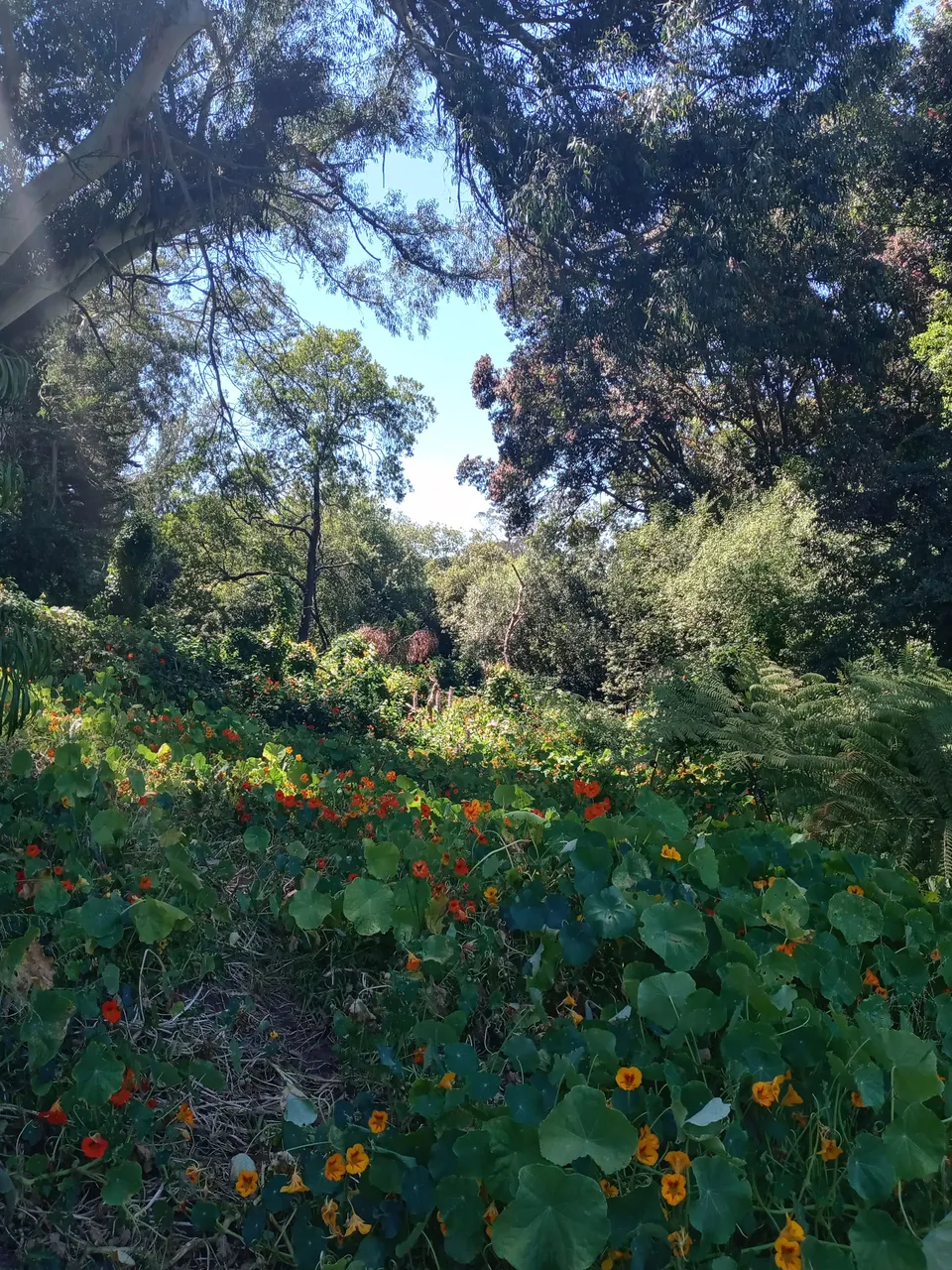
-- and just at hand.

The Appassionata's first movement is quite long, and there are some gloriously tranquil moments in it, even quite late ... that last arrival in a D flat statement of the second theme in the coda ... in D flat in which F minor and G flat still can live tranquilly ... quite late in the summer of 2023, there were still a few days and moments like this with her ... one takes such peaceful days and moments and fastens one's hope upon them.
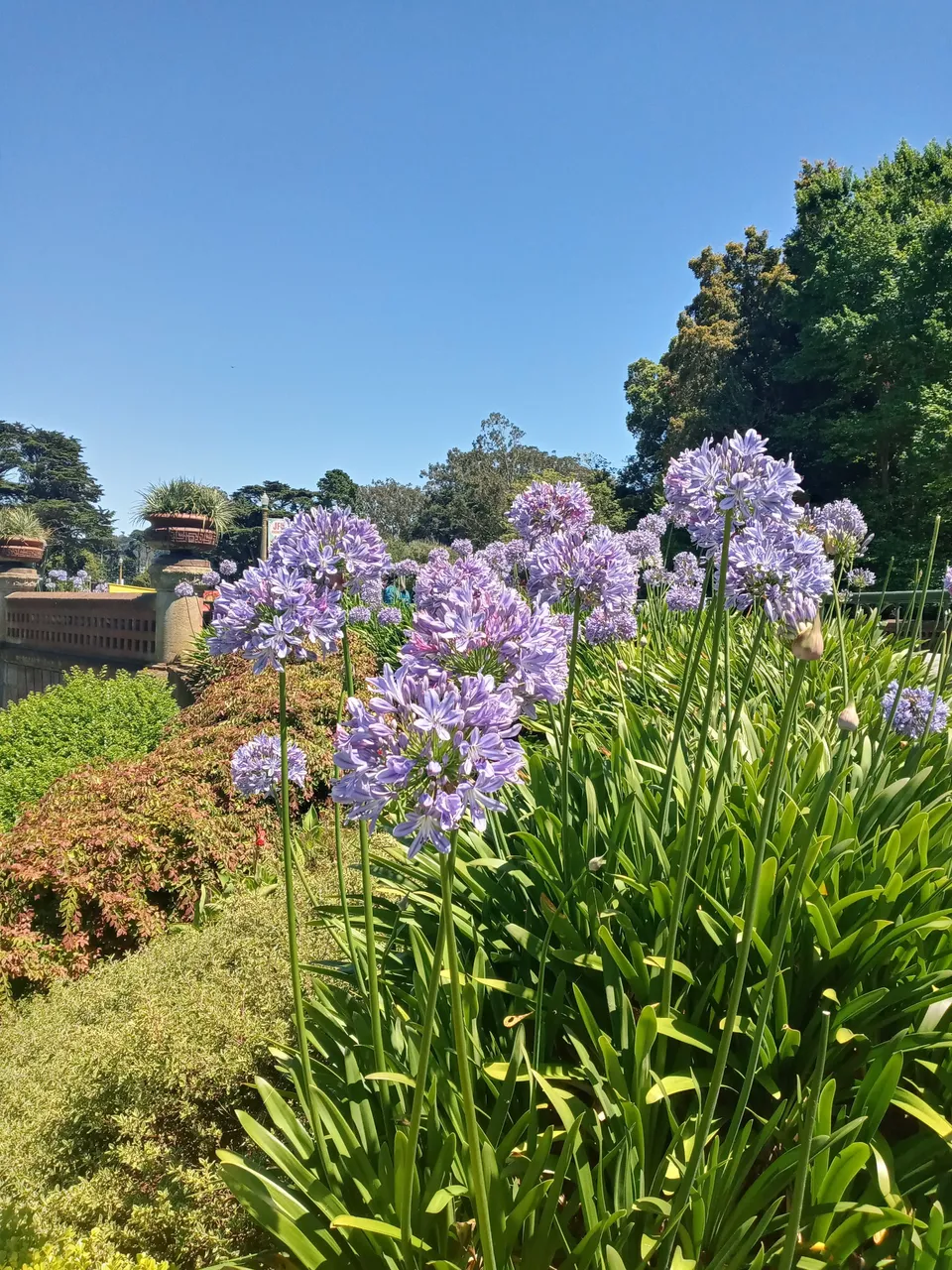
Yet I like to think that if I had known Schubert's Winterreise back then, I might have realized sooner that it was hopeless, because there are unrecoverable positions that one can express from very early in the end game.
I love my bad behaviors!
It so confused me that I did not understand there was no hope, right there ... that was simply incomprehensible to me as anyone's actual working position in life. Put another way: I am fully aware of my own human capacity for evil, and am seeking in every way possible not to walk in that capacity. I know how much grace I have needed and still need, and so I tend to extend that grace to other people in their misbehavior -- and to age 42, I thought anyone raised in a commensurate way to me with commensurate opportunities and commensurate profession of faith was at least attempting the same thing I am daily attempting to do. So, "I love my bad behaviors" flew right over my head -- that simply could not be an actual reality, could it? Was I really going to see a friend embrace her depravity in the coming months, and thus, turn on me with destroying viciousness?
Yes. Yes, I would, and I did. Ten months later, I think the pain might still be hitting so hard because I am still surprised, just as the Appassionata still surprises me in the first movement. Light is there from the beginning. G flat is there. A flat is there. E makes a gorgeous appearance. F major enters at the recapitulation and takes over the first and second theme -- a Herculean effort! D flat makes two attempts, one before and one after the recapitulation! None can avail where light is refused ... and so by the third movement, there is no light left. What remains there is "Abandon hope, all ye that enter here!"
But ... to go back ... when it came to the end ... it ended very like the ending of the first movement of the Appassionata, quietly ... I went "no contact" ... and so, Web 2 not understanding still, so it remains ...
But then, what happens when you get here, to a point in which your life can be peaceful and integral and have the parts of it correctly coming together --

-- and can stay, because you have not refused the light?
I added a D flat 1 at the very end, a note that Beethoven could not have written for piano at that time, just to close as complete what I chose to play (because without sheet music, the rest was going to get hairy!)
But of course, having put down a double-deep tone, that opened the portal of imagination, and thus came this: in his most splendid double-deep approximation of his mortal basso profundo voice.
"You are now asking the right questions, Frau Mathews, and you will find that you already know the answer."
The Ghost of Musical Greatness Past materialized in one of the chairs just beyond that piano.
"Well-played in every way, Frau Mathews. I commend you for the courage and self-control necessary to meet your anniversary stress head on, and to choose to examine and think and then remember Beethoven, who helped you so much with his 'Elegischer Gesang.' You are meeting your anniversary stress head on, and we shall say about it, du hast vollendet, as it says at the end of 'Elegischer Gesang.'"*
"Not yet full-ended -- I wish I were -- but I am making my best attempt to get there," I said.
He smiled gently.
"I permit you to contradict me without correction," he said, "because you will correct yourself after walking through a little more. The lily pond awaits its rescue, alas, but it is but a little walk from this beautiful place --"
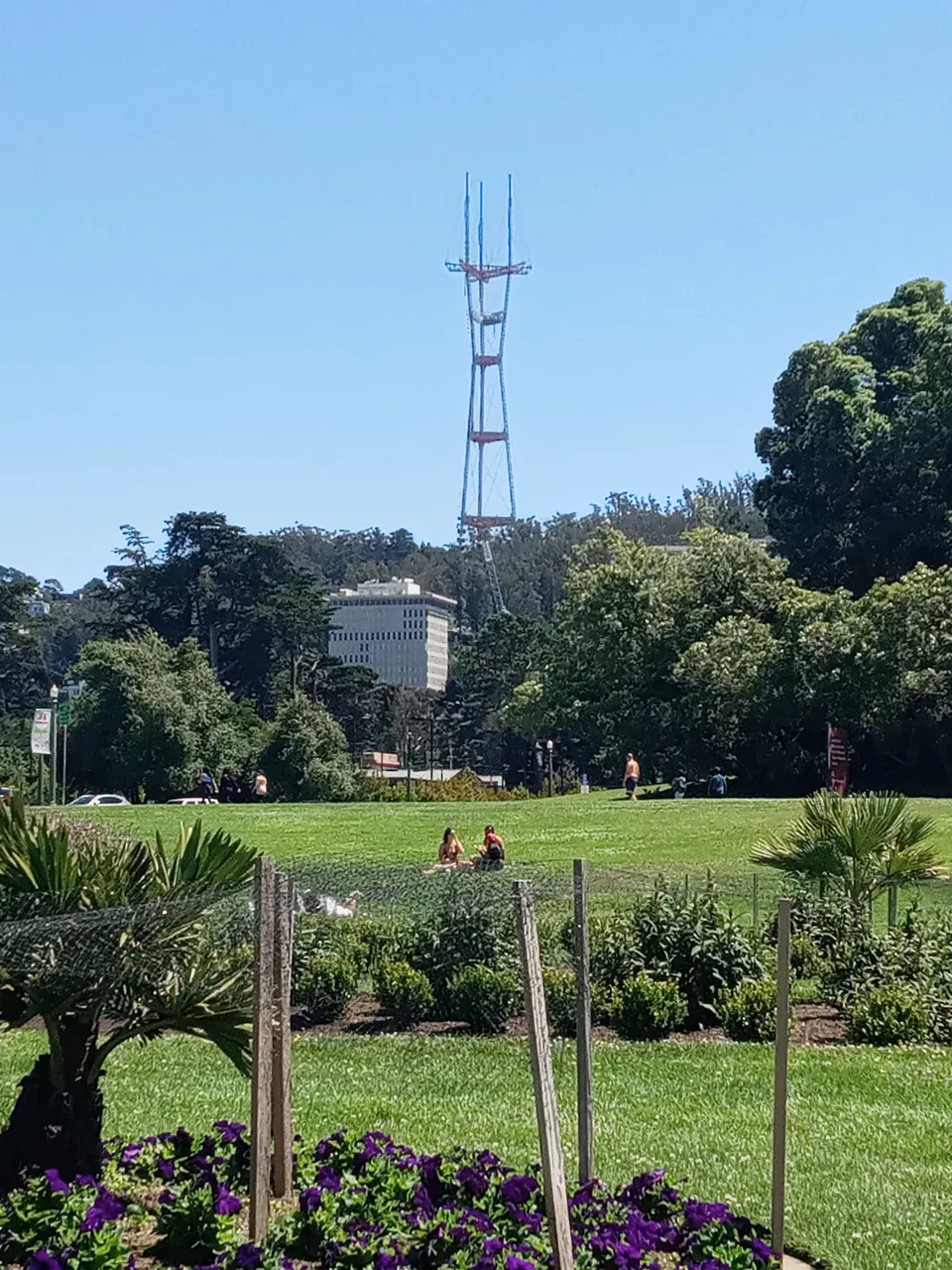
-- to a change of scene we overlooked a little when last on our way to the lily pond."

"Let's go enjoy that," I said, and he smiled as I picked up his very gentle invitation.
A long, long time in silence ... my companion uttered not a note, for of course he had heard that I desired to take in the sonata of summer, and it was definitely playing strongly in Golden Gate Park's Tree Fern Dell ... across the way from the Conservatory of Flowers, and just a little on from the Oak Woodlands, this subtropical seeming glory, somehow fitting in! The day was so beautiful, and peaceful without those for which I was still feeling pain ...
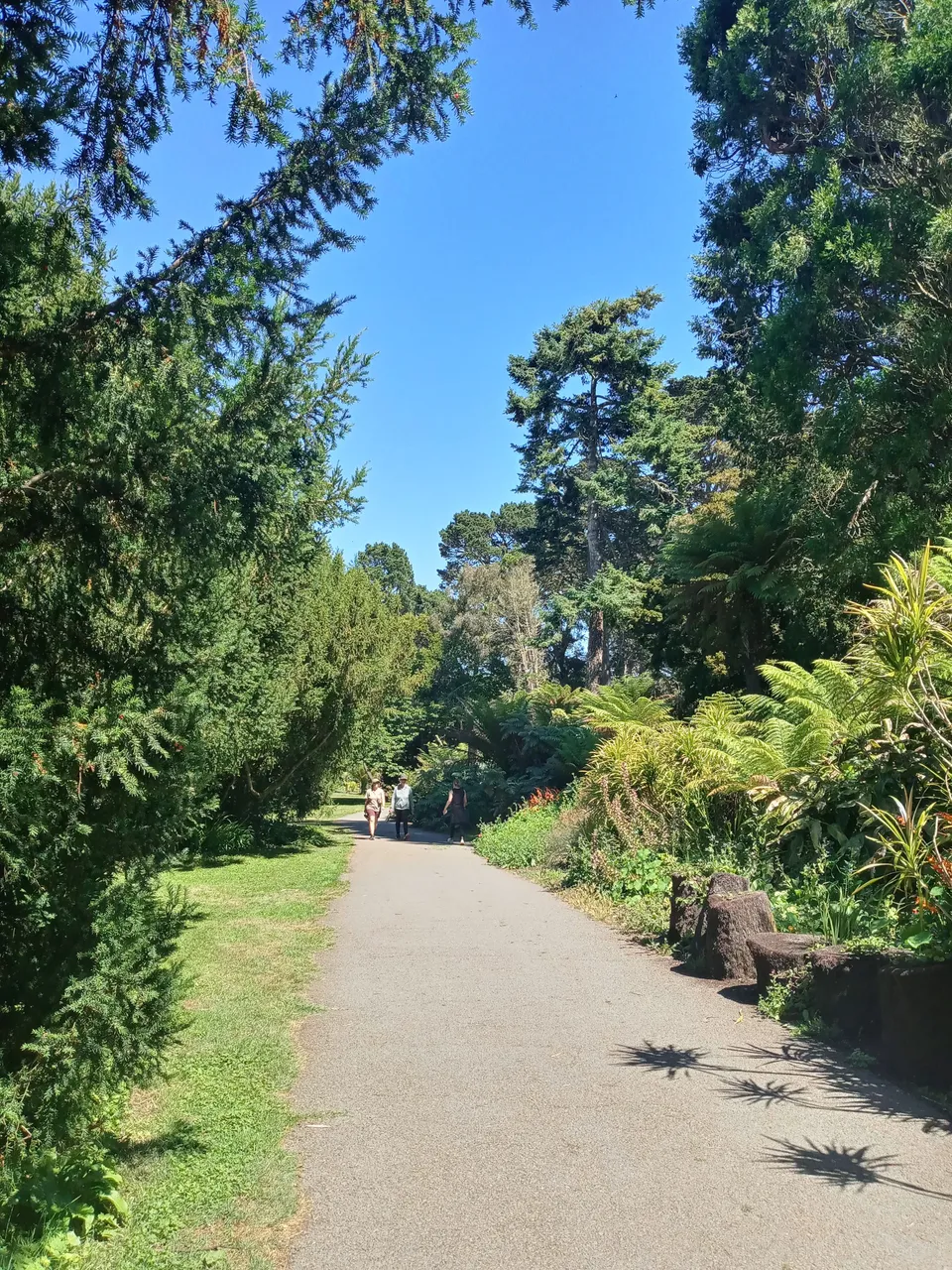
... summer offers a great deal of glorious perspective ...

... for 2022 and 2023 had not been so peaceful ... I was unencumbered in this summer with everything but my true responsibilities... and they were heavy enough... but to take on no more ... and have to take on no more? What was wrong? How could I still feel such anguish?
My companion remained silent, leaving me in my thoughts and even in the pain as I desired, but at a moment when light came through a lone oak tree in a particular way...

... we encountered his doppelganger, in his youth, playing his beloved cello, warming up on a scale ... F minor, and all the chords on its scale steps ... and then F Phyrgian, with all the chords possible on its scale steps ...
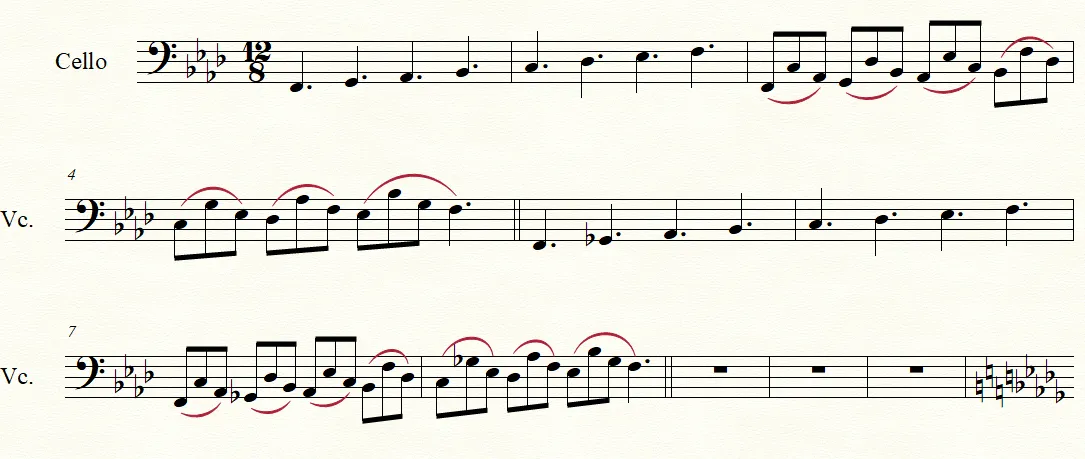
... but without having Beethoven's extensive knowledge of modes, just flat the G in an F minor scale and you realize: the same thing that gets you that beautiful G flat chord also costs you a C diminished chord -- that terrible tritone is inevitable. So, the Appassionata's first movement ends the way it does because it begins the way it does: the key signature says the key is F minor, and that means G flat is going to have to be cast out, no matter how much of an equal partner it appears to be at the beginning! Beethoven does it twice in the coda to make the point, literally diminishing G flat through that C diminished chord to nothing but an accidental in a progression that is going to assert that the key is, indeed, F minor.
But then ... if one can get into D flat and stay there ... then F minor and G flat can live in peace with each other ... the wind sighed more happily as the young cellist my companion remembered being put forth a simple melody that made the point...

... and although it is subtle in the Appassionata, Beethoven also lets it be known that he knows that ... the first part of his second movement theme is built around a calm, stately alternation between D flat and G flat, and the high point of that theme in the second half is a D flat chord in first inversion, F in the bass, big open A flats in octaves on top ... the common tones that D flat and F minor have in common, highlighted ... and thus, he makes all the peace and reconciliation with what has just happened as there can ever be. That is why that second movement is so relieving ... and, one does not have to play the third movement, after all ... in fact, the memory returned to me ...
"When I was a teenage student, playing my way through Beethoven slow movements, I took that big diminished seventh in that movement and just added two chords to resolve it ... but even that is not necessary. Today I just hark back to the opening of the movement, and let it go. I couldn't play the third movement back then, and I have no desire to play it now. I choose not to go that way, and I don't have to because I chose that the life of a performing artist was not for me."
"I said earlier that you were asking the right questions," my companion said gently, "and I knew that you would also find that you already know the answer. Beethoven in two movements shows how not to have peace, because light, as beautiful as it is, can have no concord with darkness, and also how to have peace, with all things in their proper place in the light. Now he had a sonata to finish, but since your job is not his job, and because you chose not to pursue a career as a concert classical pianist, you can remain in D flat, and close the book on the rest.
"In life, Frau Mathews, seeing that every effort you made to bring light into darkness was being dismissed and diminished, because light has no concord with darkness, you chose not to spiral into rage and madness with others, but to leave. You chose the peace you live in now, in the light. The pain may never completely go away, and the memory of what came before may remain with you until you leave this earth ... but you are in the light, and as F minor is beautiful right next to G flat in the key of D flat, getting into and staying in the light, and closing the book on the rest, is the resolve."
I considered this, and then smiled.
"You were right, my teacher. Sie war richtig, mein Lehrer. Ich habe vollendet."
"Du hast vollendet, meine Studentin," he purred. "You have indeed reached a full end in this matter. I knew you would correct yourself in a little while, for you have indeed known the answer for almost 30 years. Even Beethoven can be taken or left ... and also Möll, who if he did not know before, knows now!"
"I don't think you had to wait until permanent retirement to know that, given what I can know of your biography," I said. "And that is why you are here. Rare are the gifted men who any woman knows who can be that gifted, and not feel the need to impose to get the appreciation from solving all problems ... or even impose because his heart cannot endure seeing one that he loves in pain even long enough for her to find for herself what she must do. The latter is more excusable than the former ... but just as damaging in the long run, for both are forms of playing God."
"You are 43, and have learned that last part of wisdom the hardest way possible," he said. "I know the deep love in your heart even now for those you have left behind ... but you have carried with you the wisdom that you need, and that, someday, you may be able to share to help someone who loves you dearly know how to love you well. Indeed it is not easy for a man, for both reasons that you mentioned, to not impose his idea of a solution in any situation that he can. It is not easy for any dynamic, creative person, man or woman, to not, if not least for the reasons of the heart -- and as I have said, Frau Mathews, you have learned that wisdom in the hardest way possible. Yet you have learned it, and if you remember, walk, abide, and adorn yourself in it, you never need have lessons like those of 2022 and 2023 again."

"As I have said to you many times, Frau Mathews, I am just the echo of that Voice Who has worked it out so that even pain has a place in the holy accord of the life you are called to, like F minor has a place in D flat. All the solutions to all your problems, as long as you are in this earth, will be found as you walk, abide, and adorn yourself in your calling. Where everything fits in -- that too will be found along the more excellent way of love. Love cannot interfere with itself, so it is hardly my calling today to use my voice in any way to interfere with the presence and purpose of pain in your life, in its proper place. I commend you for not even asking. Your discipline, self-control, and wisdom are ever growing, Frau Mathews.
"An important corollary: it is written of Him Who has called you: 'A bruised reed shall He not break, and a smoking flax shall He not quench: He shall bring forth judgment unto truth.' Now, we have spoken today of knowing one's job in passing. Beethoven's job was to write Opus 57, all the way out. It is not your job to play it, all the way out, so you may close the book on the parts you cannot play.
"We are human beings, Frau Mathews. There are parts we cannot play. Pain for others is as inevitable and necessary as it is for us, no matter how much we love them. You imagine, correctly, that since I have come out of permanent retirement to visit you on Earth, pain from certain memories is part of the process for me -- I am still a human being, and pain is part of the earthly experience for human beings. And, you write yourself as you are ... there is nothing you would not do to comfort one you loved if you could.
"But look again ... a bruised reed, left to itself too long, will die, and a smoking flax will eventually catch fire to itself and everything around it. There is a painful level of discipline and self-control necessary to watch such things happen to people in such processes, and still another level of painful discipline and self-control to leave certain situations in which the fire has broken out. But that is required, for you may be certain that wherever it is written that He will not, we as mere mortals cannot. There are parts we simply cannot play.
"But all that is written there will be fulfilled, Frau Mathews -- it is His great sonata, to follow the day's analogy, to work out with all its themes. Just because we cannot bring forth judgment into truth does not mean it will not happen. It will, for He will. It requires patience, humility, discipline, and self-control to let that be the resolve for all such matters, but I show to you in corollary the foundation and safeguard of your present peace. There is not a part that shall be left undone, so you may rest in the One Who shall work all things out, in His time, and close the book on the parts you simply are not called to play."
Then he smiled, and it seemed that as bright as it was, it became brighter and warmer still in his joy ... in mortal life he had that ability, and at this stage of his existence, his changing the subject from grimness to delight was stunning.
"That understanding frees you to play what only you can play, Frau Mathews ... do not think I did not notice what you did on Sunday night to calm those you love in the latest moment of political upheaval ... how you took what you knew Beethoven knew in Opus 57's second movement, added a bit of rhythmic help from Beethoven's Opus 109, confronted the conflict as he did, and took D flat and openly addressed and resolved it to beautiful, calm peace!"
(And see, @mipiano, when I THINK ABOUT scoring the piece before hand, it tends to go better ... A Moment of Musical Peace, scored here!)
"Well, I guess I did!" I said.
"My dearest Frau Blumenkind," he said, and then laughed merrily.

"Your forgetfulness is so delightful, my late-blooming flower child!" he said after that enjoyment of laughter. "But sometimes you are doing what you are doing as an artist while in a crucial time, and you do not realize all the details. Yet I have been saying to you from my first visit that it is your time, Frau Mathews. Play what only you can play, in your time, and on the rest, you may close the book, and keep it closed. Du hast vollendet!"
"Ich habe vollendet -- I have made a full end of my past matters, and need not reopen any of those doors again. Thank you for being a good echo, as ever!"
"My duty, my honor, my pleasure, Frau Mathews," he said.
